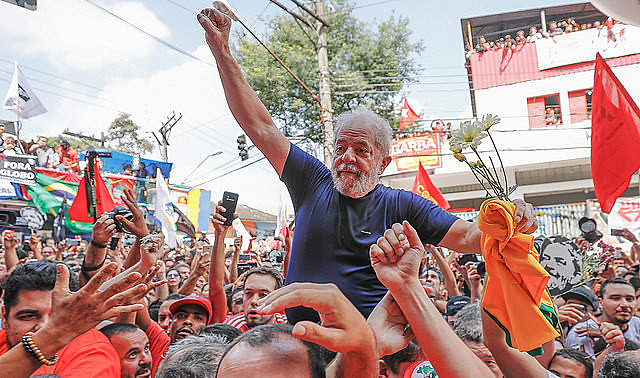Late on Sunday evening, results of the Brazilian Presidential election trickled in, and former President Luiz Inácio Lula da Silva, commonly known as Lula, beat far-right incumbent Jair Bolsonaro. Bolsonaro, who has wrought havoc on the country since he came to power in 2019, is the first President of Brazil to lose an election while incumbent in over 3 decades.
It was neck and neck throughout the entire contest and Lula won by the smallest of margins, securing 50.9% to Bolsonaro’s 49.1% in the runoff contest.
Lula was President of Brazil from 2003-2010 and his government’s legacy is that of significantly reduced poverty and malnutrition, support for human rights, and cementing Brazil’s position in the international community.
He was jailed in 2018 for passive corruption, but his imprisonment was overturned by the Supreme Court after huge efforts from campaigners both in Brazil and across the world. The case was widely seen as a corruption attempt to secure the presidency for Bolsonaro, after Lula announced he would be standing in the last election.
Bolsonaro’s legacy stands in stark opposition to Lula’s and is that of Covid, climate destruction & worsening inequality. It’s estimated that nearly three quarters of a million people have died since the start of the Pandemic – a figure only surpassed by the United States. Bolsonaro himself has had the Virus on three separate occasions and refused to restrict movement to limit the spread of the Virus. A report from King’s College London published last year said “the president systematically downplayed the risks and blocked any centrally coordinated response. He also undermined mayors and state governors when they tried to impose their own lockdowns, social distancing rules or mask mandates.” Since then, the Pandemic has only worsened.
Inequality in Brazil has been a key issue since the country first emerged from dictatorship in the 1980s. It remains key today with nearly 10 million people facing unemployment and millions more suffering with food shortages. In response, Bolsonaro told people to “stop whining” and said hunger does not really exist in Brazil.
During Lula’s two terms deforestation in the Amazon Rainforest fell by over 80%. Meanwhile under Bolsonaro, it has increased by nearly a third in half the time. Today Lula said “we want environmental pacification, we are not interested in a war for the environment, but we are ready to defend it from any threat”.
In the same victory speech, Lula said “We can’t accept it as normal that in this country millions of men, women and children don’t have enough to eat … we have the duty to guarantee that every Brazilian can eat breakfast, lunch and dinner every day.”
Many world leaders welcomed the victory, in comparison with Bolsonaro’s increasingly isolationist position on the world stage. Even Joe Biden said he welcomed future co-operation between the two American nations, perhaps highlighting how Lula’s legacy has developed since he was last in power.
The defeat of Bolsonaro will be celebrated across Brazil by climate activists, anti-poverty campaigners and indigenous populations the world over. But Lula won’t be able to survive on his legacy and rhetoric alone. This will be made all the harder after the elections earlier this month that saw the presidential vote require a run-off. The far right did far better than expected in governor elections and numerous ministers in Bolsonaro’s government were elected – including former Judge Sergio Moro, who led the so-called anti-corruption probe that saw Lula jailed.
There have also been notable shifts from Lula’s previous campaigns as Lula sought to attract support from a broader range of the electorate. It worked, but it’s also came with reduced support in the streets and Lula hasn’t discussed his party’s programme to the same extent as previously. Despite the obvious divisions in Brazilian society, exacerbated by Bolsonaro, Lula has said he does not want to be divisive – seeking instead to be a promoter of peace appealing to moderates across the country.
In a country like Brazil, where politicians are routinely murdered and polarisation between political forces is rife, the need for peace is apparent. However, it remains to be seen how it will affect the introduction of crucial new reforms. If Lula wants to appeal to all sides, it will affect his ability to deliver change, and with parliament at national and state level working against him, it will be even more difficult for him to overturn Bolsonaro’s legacy. Leftists should look on with a critical eye to see how much he will actually be able to deliver. Nonetheless, the streets of Brasilia will sleep more soundly, knowing Bolsonaro will be gone come the new year.
Peter Stoddart, is the Treasurer of the YCL



